[vip专享]2013-2014学年第二学期高三期中英语测试卷及答案
- 格式:pdf
- 大小:273.19 KB
- 文档页数:7
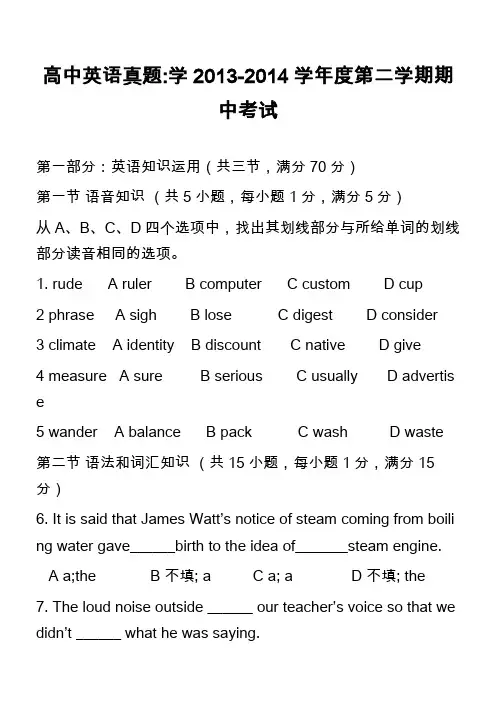
高中英语真题:学2013-2014学年度第二学期期中考试第一部分:英语知识运用(共三节,满分70分)第一节语音知识(共5小题,每小题1分,满分5分)从A、B、C、D四个选项中,找出其划线部分与所给单词的划线部分读音相同的选项。
1. rude A ruler B computer C custom D cup2 phrase A sigh B lose C digest D consider3 climate A identity B discount C native D give4 measure A sure B serious C usually D advertis e5 wander A balance B pack C wash D waste 第二节语法和词汇知识(共15小题,每小题1分,满分15分)6. It is said that James Watt’s notice of steam coming from boili ng water gave______birth to the idea of_______steam engine.A a;theB 不填; aC a; aD 不填; the7. The loud noise outside ______ our teacher’s voice so that we didn’t ______ what he was saying.A. put out; hearB. drowned; recognizeC. cut out;seeD. threw away; know8. We should think carefully about ________ Mr. Needham said at the meeting.A. thatB. whatC. whichD. X9. I have told you the truth. ______ I keep repeating it?A. MustB. CanC. MayD. Will10. What do you mean, there are only ten tickets? There______ _be twelve.A. shouldB. wouldC. willD. S hall11.I doubted______or not they could finish the task on time if th ey didn’t set about it at once.A.ifB.whetherC.howD.that12. He did not regret saying what he did but felt that he_______ _ it differently.A. could expressB. would expressC. could have expressedD. must have expressed13. She _________ down her book and ________ in bed.A. lay; laidB. laid; layC. lay; layD. laid; laid14. If you cheat in the exam, you could hardly _________ it.A. throw awayB. get awayC. get away fromD. get aw ay with15. Great changes ______ in our school in the past 10 years.A took placeB have taken placeC were taken placeD have been taken place16. ---Would you mind if I turned off the light?---____________.A. Yes, go aheadB. No, please don’tC. Go ahead, pleaseD. Certainly, do as you please17. Not believing their eyes, the visitors on the spot_______ the flying plane, doing some most difficult and dangerous tricks in t he sky.A. glared atB. stared atC. glanced atD. caught sight of18. ---You are quite free now, I think.---_______, I have tons of things to do.A. On the contraryB. on the oppositeC. With the contraryD. For the contrary19.________leaves the room last ought to turn off the lights.A. AnyoneB. The personC. WhoeverD. Who20. Before making any changes, the headmaster always ______ the teachers to find out what is the most important to the studen ts.A.consultsB.suggestsrmsmands 第三节:完形填空(共20小题;每小题1分,满分20分)阅读下面短文,从短文后各题所给的四个选项(A、B、C和D)中,选出可以填入空白处的最佳选项,并在答题卡上将该项涂黑。
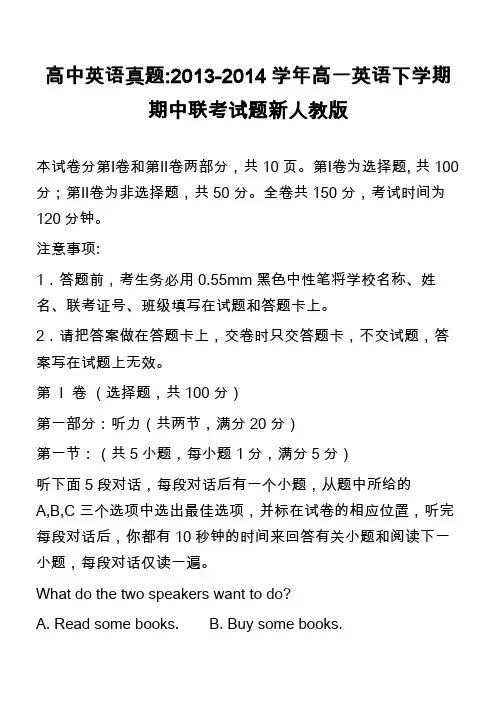
高中英语真题:2013-2014学年高一英语下学期期中联考试题新人教版本试卷分第Ⅰ卷和第Ⅱ卷两部分,共10页。
第Ⅰ卷为选择题, 共100分;第Ⅱ卷为非选择题,共50分。
全卷共150分,考试时间为120分钟。
注意事项:1.答题前,考生务必用0.55mm黑色中性笔将学校名称、姓名、联考证号、班级填写在试题和答题卡上。
2.请把答案做在答题卡上,交卷时只交答题卡,不交试题,答案写在试题上无效。
第Ⅰ卷(选择题,共100分)第一部分:听力(共两节,满分20分)第一节:(共5小题,每小题1分,满分5分)听下面5段对话,每段对话后有一个小题,从题中所给的A,B,C 三个选项中选出最佳选项,并标在试卷的相应位置,听完每段对话后,你都有10秒钟的时间来回答有关小题和阅读下一小题,每段对话仅读一遍。
What do the two speakers want to do?A. Read some books.B. Buy some books.C. Do some sports.2. What will the woman do?A. Study in the library.B. Attend a class.C. Play a card game.3. What time does the express leave?A. At 9:25.B. At 9:50.C. At 9:15.4. Whose gloves are orange?A. Mom’s.B. Susan’s.C. John’s.5. How do the two speakers feel?A. Happy.B. Stressed.C. Frightened.第二节:(共15小题,每小题1分,满分15分)听下面5段对话或独白。
每段对话或独白后有几个小题,从题中所给的A、B、C三个选项中选出最佳选项,并标在试卷的相应位置。
听每段对话或独白前,你将有时间阅读各小题,每小题5秒钟;听完后,各小题将给出5秒钟的作答时间。
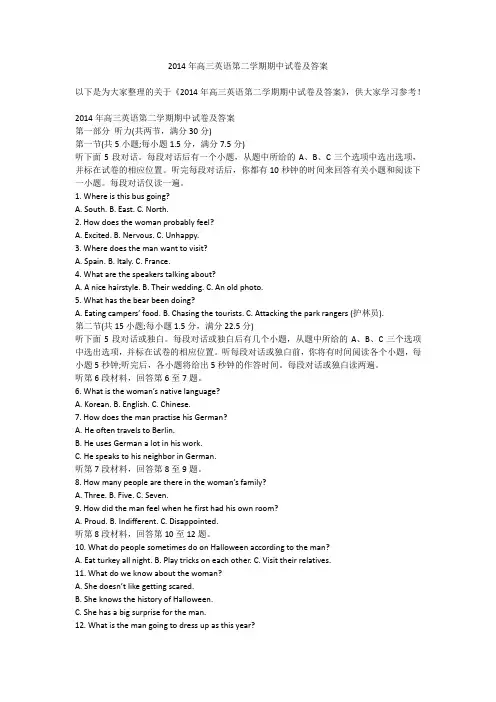
2014年高三英语第二学期期中试卷及答案以下是为大家整理的关于《2014年高三英语第二学期期中试卷及答案》,供大家学习参考!2014年高三英语第二学期期中试卷及答案第一部分听力(共两节,满分30分)第一节(共5小题;每小题1.5分,满分7.5分)听下面5段对话。
每段对话后有一个小题,从题中所给的A、B、C三个选项中选出选项,并标在试卷的相应位置。
听完每段对话后,你都有10秒钟的时间来回答有关小题和阅读下一小题。
每段对话仅读一遍。
1. Where is this bus going?A. South.B. East.C. North.2. How does the woman probably feel?A. Excited.B. Nervous.C. Unhappy.3. Where does the man want to visit?A. Spain.B. Italy.C. France.4. What are the speakers talking about?A. A nice hairstyle.B. Their wedding.C. An old photo.5. What has the bear been doing?A. Eating campers’ food.B. Chasing the tourists.C. Attacking the park rangers (护林员).第二节(共15小题;每小题1.5分,满分22.5分)听下面5段对话或独白。
每段对话或独白后有几个小题,从题中所给的A、B、C三个选项中选出选项,并标在试卷的相应位置。
听每段对话或独白前,你将有时间阅读各个小题,每小题5秒钟;听完后,各小题将给出5秒钟的作答时间。
每段对话或独白读两遍。
听第6段材料,回答第6至7题。
6. What is the woman’s native language?A. Korean.B. English.C. Chinese.7. How does the man practise his German?A. He often travels to Berlin.B. He uses German a lot in his work.C. He speaks to his neighbor in German.听第7段材料,回答第8至9题。
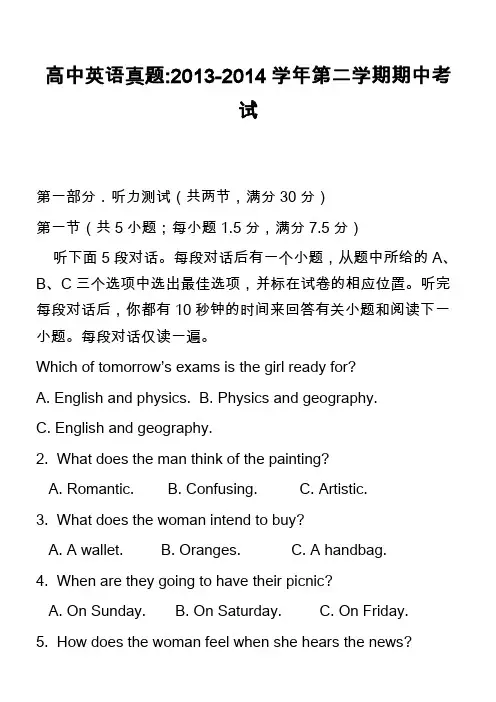
高中英语真题:2013-2014学年第二学期期中考试第一部分.听力测试(共两节,满分30分)第一节(共5小题;每小题1.5分,满分7.5分)听下面5段对话。
每段对话后有一个小题,从题中所给的A、B、C三个选项中选出最佳选项,并标在试卷的相应位置。
听完每段对话后,你都有10秒钟的时间来回答有关小题和阅读下一小题。
每段对话仅读一遍。
Which of tomorrow’s exams is the girl ready for?A. English and physics.B. Physics and geography.C. English and geography.2. What does the man think of the painting?A. Romantic.B. Confusing.C. Artistic.3. What does the woman intend to buy?A. A wallet.B. Oranges.C. A handbag.4. When are they going to have their picnic?A. On Sunday.B. On Saturday.C. On Friday.5. How does the woman feel when she hears the news?A. Pleased.B. Upset.C. Annoyed.第二节(共15小题;每小题1.5分,满分22.5分)听下面5段对话或独白。
每段对话或独白后有几个小题,从题中所给的A、B、C三个选项中选出最佳选项,并标在试卷的相应位置。
听完每段对话或独白后,你将有时间阅读各个小题,每小题5秒钟;听完后,各小题将给出5秒钟的作答时间。
每段对话或独白读两遍。
听第6段材料,回答第6、7题。
What’s the relationship between the two speakers?Next-door neighbors. B. Boss and employee.C. Teacher and student.What kind of look did the stranger probably have?A. He had a special look.B. He had an ordinary look.C. He had a terrible look.听第7段材料,回答第8-10题.What is NOT included the woman’s daily activities?A. Bathing the baby.B. Taking the dog for a walk.C. Visiting friends.9. What does the woman mainly express?A. Housewives’ need for a change in their life.B. Housewives’ need for proper jobs.C. Men’s dissatisfaction with their wives.10. What can we learn from the dialogue?The woman does not want her husband to stay at home.The husband does not know how to comfort his wife.The husband does not care for his wife at all.听第8段材料,回答第11-13题.Where does the conversation probably take place?In the woman’s lab. B. In a furniture store. C. In a factory. How much will a new sofa cost?59 dollars. B. 63 dollars C. 65 dollars.When would the woman probably come again?A. Next Thursday.B. Next Saturday or Sunday.C. In two wee ks.听第9段材料,回答第14-16题.14. Which of the following countries has the woman been to?A. Italy.B. France.C. Spain.15. Why doesn’t the man want to go abroad?A. Because it’s cooler in .B. Because he doesn’t want to visit new places and meet new p eople.C. Because it doesn’t need to plan much to stay in .16. What holiday are the speakers talking about?A. The summer holiday.B. The winter holiday.C. The spring holiday.听第10段材料,回答第17-20题.17. What does the speaker mainly talk about?A. How to make a speech in foreign languages.B. How to make bored audience become interested.C. How papers should be introduced in public.18. Why is discussion important according to the speaker?A. Because other people’s criticism could help you to improve it.B. Because it is not easy to pick up detailed information by your self.C. Because you can explain the main points in spoken languag e.19. What can’t you do when introducing your paper?A. You can’t let people pick up detailed information.B. You can’t simply read the whole paper aloud.C. You can’t let audience speak out their opinions.20. How do listeners feel if you read something aloud?A. Relaxed.B. Bored.C. Calm.第二部分:英语知识运用(共两节,满分35分)第一节:单项选择(共15小题,每小题1分,满分15分)从A.B.C.D四个选项中,选出可以填入空白处的最佳选项,并标在答题纸上。
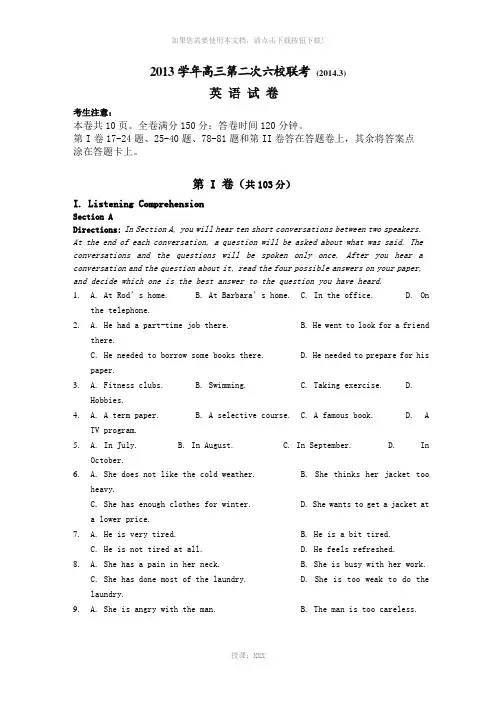
2013学年高三第二次六校联考(2014.3)英语试卷考生注意:本卷共10页。
全卷满分150分;答卷时间120分钟。
第I卷17-24题、25-40题、78-81题和第II卷答在答题卷上,其余将答案点涂在答题卡上。
第 I 卷(共103分)I. Listening ComprehensionSection ADirections: In Section A, you will hear ten short conversations between two speakers. At the end of each conversation, a question will be asked about what was said. The conversations and the questions will be spoken only once. After you hear a conversation and the question about it, read the four possible answers on your paper, and decide which one is the best answer to the question you have heard.1. A. At Rod’s home. B. At Barbara’s home. C. In the office. D. Onthe telephone.2. A. He had a part-time job there. B. He went to look for a friendthere.C. He needed to borrow some books there.D. He needed to prepare for hispaper.3. A. Fitness clubs. B. Swimming. C. Taking exercise. D.Hobbies.4. A. A term paper. B. A selective course. C. A famous book. D. ATV program.5. A. In July. B. In August. C. In September. D. InOctober.6. A. She does not like the cold weather. B. She thinks her jacket tooheavy.C. She has enough clothes for winter.D. She wants to get a jacket ata lower price.7. A. He is very tired. B. He is a bit tired.C. He is not tired at all.D. He feels refreshed.8. A. She has a pain in her neck. B. She is busy with her work.C. She has done most of the laundry.D. She is too weak to do thelaundry.9. A. She is angry with the man. B. The man is too careless.C. She wants to throw the tablecloth away.D. She doesn’t think itserious.10. A. The switch of the machine is probably broken.B. The machine may not have been turned on.C. The woman should try another copy machine.D. The machine needs to be checked by someone.Section BDirections: In Section B, you will hear two short passages, and you will be asked three questions on each of the passages. The passages will be read twice, but the questions will be spoken only once. When you hear a question, read the four possible answers on your paper and decide which one would be the best answer to the question you have heard.Questions 11 through 13 are based on the following passage.11. A. Usage of Water. B. Common Expressions.C. Expressions about Water.D. A Story about Water.12. A. Being in hot water. B. Being in deep water.C. Keeping your head above water.D. Throwing cold water.13. A. The story is in deep water. B. Keep your head above water.C. The story throws cold water on me.D. The story can’t hold water. Questions 14 through 16 are based on the following passage.14. A. Whether it is allowed for workers to take iPods to work.B. Whether communication is needed while working in office.C. Whether bosses care about how employees accomplish their goals.D. Whether it should be banned to listen to music while on the job.15. A. Woods Bagot. B. Simon Pole. C. Gary Cooper. D. Bosses.16. A. Workers need barriers to separate themselves from others.B. It may help to improve the workers’ efficiency.C. It is important to learn to communicate at work.D. Workers should not be bothered while working.Section CDirections:In Section C, you will hear two longer conversations. The conversations will be read twice. After you hear each conversation, you are required to fill in the numbered blanks with the information you have heard. Write your answers on your answer sheet.Blanks 17 through 20 are based on the following conversation.Blanks 21 through 24 are based on the following conversation.Complete the form. Write no more than THREE WORDS for each answer.II. Grammar and VocabularySection ADirections: After reading the passages below, fill in the blanks to make the passages coherent and grammatically correct. For the blanks with a given word, fill in each blank with the proper form of the given word; for the other blanks, use one word that best fits each blank.(A)When I was young, my marks in school were miserable. After supper, I would lie on bed and stare for hours __25__ the tube. The background noise of my life was gunfire from "Wagon Train", and laughter from "I Love Lucy" or "Mister Ed". Apparently, I couldn’t care __26__ (little) about my study.One day, my Mom snapped off the TV and asked me to read two books every week and take reading notes." I complained about __27__ unfair it was for I didn't have any books in the house other than the Bible. But she explained that she would drive me where the books were.So pretty soon, there was a boy sitting in a white 1959 Oldsmobile on his way to Detroit Public Library and ___28__ (wander) reluctantly among the children's books. The first book I read through was Chip the Dam Builder, which was about beavers. For the first time in my life I was lost in another world. No television program ___29 ___ (take) me so far away from my surroundings as did this verbal visit to a cold stream in a forest and these creatures building a home.It dawned upon me __30__ reading was quite different from watching TV ---- there were images forming in my mind instead of before my eyes and I could return to them again and again with the flip of a page. Soon I moved from animals to plants, and then to rocks. Along the way a funny thing happened: I got to the point __31__ I couldn't wait to get home to my books.Now I am a botanist in Baltimore. Sometimes I still can't believe my life's journey, from an indifferent student to this position. But I know the journey began __32___ Mom turned off the TV and put me in her car for that drive to the library.(B)High-quality customer service is preached(宣扬) by many, but actually __33__ (keep) customers happy is easier said than done.Shoppers seldom complain to the manager or owner of __34__ retail store, but instead will alert their friends, relatives, co-workers and anyone who will listen. For every dissatisfied customer, a store will lose up to three more due to negative reviews and t he resulting “snowball effect” can be disastrous to ret ailers, according to a study jointly __35___ (conduct) by Verde Group and Wharton School.The most common complaints include filled parking lots, cluttered shelves, overloaded racks, out-of-stock items, long check-out lines, and rude salespeople. __36__ (relieve) the headaches, retailers can redesign store layouts, pre-stock sales items, and hire speedy and experienced cashiers. During peak shopping hours, some retailers dealt with the parking problems by getting moonlighting (业余兼职的) local police to work as parking attendants; __37__ retailers hired flag wavers to direct customers to empty parking spaces. This guidance eliminated the need for customers to circle the parking lot endlessly, thus __38__ (avoid) confrontation (对峙) between those eyeing the same parking space. Actually, responsive and friendly retailers are more likely to smooth over issues with angry customers.It is suggested that complaints __39__ (make) to the retailers directly rather than to the rest of the world. Retailers are hard-pressed to improve when they have no idea what it is __40__ goes wrong.Section BDirections:Complete the following passage by using the words in the box. Each word can only be used once. Note that there is one word more than you need.“During my lifetime I have dedicated myself to t his struggle of the African people. … I have cherished the ideal of a democratic and free society in which all persons live together in harmony and with __41__ opportunities. It is an ideal which I hope to live for and to achieve. But if needs be, it is an ideal for which I am prepared to die.”Nelson Mandela __42__ his role as such when addressing his speech at the opening of his trial in 1964.Born in 1918 in a small village, Mandela studied law at University, joined the African National Congress (ANC) and began __43__ for political and social reform.He was arrested in 1962 and sentenced to five years in prison for leaving the country __44__ and inciting(煽动) workers to strike. In 1963, however, the Government brought further __45___ against him and sentenced him to life imprisonment.Mandela spent 27 years in prison. He rejected offers of early __46___ because they always came with conditions __47__. In 1990, when he was finally freed at 71, his supporters were boiling over, full of hatred and desire for revenge but he turned all that around. He thanked all those and said “I greet you all in the name of peace, democracy and freedom for all”.Mandela was ___48__ awarded the Nobel Peace Prize and became South Africa’s first black president in 1994. As President, he upheld the ideals and principles which he proclaimed during his trial and imprisonment and continued to __49__ the racial divide. In 2009 the United Nations designated an International Day to celebrate his contribution to the struggle for democracy and the promotion of peace throughout the world.He passed away at the age of 95. People will always honor this __50__ figure by applying his values and living in a way that respects and enhances the freedom of others.III. Reading ComprehensionSection ADirections:For each blank in the following passage there are four words or phrases marked A, B, C and D. Fill in each blank with the word or phrase that best fits the context.In recent years many countries of the world have been faced with the problem of how to make their workers more productive. Some experts claim the __51__ is to make jobs more varied. But do more varied jobs lead to greater __52__? There is evidence to suggest that __53__ variety certainly makes the worker’s life mo re enjoyable, it does not __54__ make him work harder. As far as increasing productivity is concerned, then variety is not an important factor.Other experts feel that giving the worker __55__ to do his job in his own way is important, and there is no doubt that this is true. The __56__ is that this kind of freedom cannot easily be given in the modern factory with its complicated machinery which must be used in a __57__ way. Thus while freedom of choice may be important, there is usually very little that can be done to ___58__ it. Another important consideration is how much each worker __59__ to the product he is making. In most factories the worker sees only one small part of the product. Some car factories are now __60___ with having many small production lines __61___ one large one, so that each worker contributes more to the production of the cars on his own.It would seem that not only is degree of worker contribution a(n) ___62___ factor but it is one we can do something about.To what __63__ does money lead to greater productivity? The workers themselves certainly think this is important. But perhaps they want more money because the work they do is so boring. Money just lets them enjoy their spare time more. A __64__ argument may explain demands for shorter working hours. Perhaps if we succeed in making their jobs more __65__, they will neither want more money, nor will shorter working hours be so important to them.51. A. answer B. course C. attempt D. system52. A. interest B. supplies C. productivity D. benefit53. A. while B. because C. since D. how54. A. specially B. actually C. suddenly D. quietly55. A. judgment B. direction C. freedom D. comfort56. A. secret B. skill C. strength D. problem57. A. amusing B. dull C. changeable D. fixed58. A. master B. supply C. create D. demand59. A. contributes B. devotes C. sticks D. objects60. A. preparing B. experimenting C. experiencing D. considering61. A. rather than B. other than C. in addition D. regardless of62. A. complex B. economic C. key D. environmental63. A. quality B. extent C. difference D. affection64. A. complete B. friendly C. familiar D. similar65. A. complicated B. interesting C. important D. essentialSection BDirections:Read the following three passages. Each passage is followed by several questions or unfinished statements. For each of them there are four choices marked A, B, C and D. Choose the one that fits best according to the information given in the passage you have just read.(A)From a boat I scanned the shore of East Island for albatross chicks (信天翁幼鸟). These largest of seabirds spend most of their lives far at sea, but at nesting time they concentrate ashore on remote islands like this one. Two albatross species had hatched their chicks four or five months earlier.I also noticed some big tiger sharks show up at the peak of the fledging season (幼鸟长羽毛季节), looking to eat young albatrosses staying in the shallows. During the months of June and July the two separate worlds of bird and fish come together.Unaware of the danger, the 30 or 40 chicks knew only that their departure time was now. I watched as some of the birds caught the wind, sailed out awkwardly over the water, and flew off into the wild blue sky, safely beyond the danger zone. Others landed a mere 30 yards from the shore, where the situation was wilder. A shark would move in and an unfortunate chick would disappear in a microsecond, before I could even raise my camera.Tiger sharks routinely start feeding at twilight, but here they fed on albatross chicks all day. The morning of June 20 was a fairly typical one. Between 6:45 and 7:45 a.m. sixteen albatross chicks flew from the beach at East Island. In that hour five were attacked and killed. As the day progressed, more wind meant more flights. And the stronger winds gave the birds an extra edge, lifting them far offshore, beyond the danger zone. The victims would fly, splash down, and smooth their wings, unaware of the danger until disaster struck.The sharks were often not as efficient as one might expect. I saw them miss their prey (猎物) by several feet on the first try, and turn around for another attack. Even if a bird survived an initial attack because the shark missed its target, the young albatross would often stay on the water. Some chicks even faced their pursuer and feebly (无力地) pecked at the shark in a vein effort to keep it off. Then they disappeared, dragged underwater, swallowed whole. A few feathers remained drifting in the water along with bits of flesh that sank slowly to the bottom, erasing all evidence of the recent drama.66.Young albatrosses fly off East Island _________.A. to avoid being killed by sharksB. to migrate to a warmer climateC. to practise flying with the aid of the windD. to depart for theirnatural habitat at sea67.What happened after a shark missed its attack on a chick?A. The shark turned around to look for another chick.B. The shark dived underwater, waiting for another chance.C. The chick awkwardly flew away beyond the shallow water.D. The chick remained at the same place, unaware of the approaching disaster.68.The word “erasing” in the last sentence can best be replaced by ________.A. recordingB. producingC. removingD.indicating69.The passage mainly tells us about ________.A. the short life of unfortunate seabirdsB. the bloody story in the animal worldC. the unique characteristic of sharksD. the amazing discovery in a remote islandNEED MORE INFORMATION?• Ask your doctor or health care provider • Go to (B)LIPITOR atorvastatin calcium tablets WHO IS LIPITOR FOR?Who can take LIPITOR: • People who cannot lower their cholesterol (胆固醇) enough with diet and exercise• Adults and children over 10Who should NOT take LIPITOR:• Women who are pregnant, may be pregnant, or may become pregnant. LIPITOR may harmyour unborn baby. If you become pregnant, stop LIPITOR and call your doctor right away • Women who are breast -feeding. LIPITOR can pass into your breast milk and may harm your baby • People with liver problems or allergic (过敏的) to anything in LIPITORPOSSIBLE SIDE EFFECTS OF LIPITORSerious side effects in a small number of people:• Muscle problems that can lead to kidney problems, including kidney failure. Your chance for muscle problem is higher if you take certain other medicines with LIPITOR • Liver problems. Your doctor may do blood tests to check your liver before you start LIPITOR and while you are taking it. Call your doctor right away if you have: • Unexplained muscle weakness or pain, especially if you have a fever or feel very tired• Allergic reactions including swelling of the face, lips, tongue, and/or throat that may cause difficulty in breathing orswallowing which may require treatment right away• Nausea, vomiting or stomach pain • Feeling more tired than usual• Your skin and whites of your eyes turn yellow• Allergic skin reactionsCommon side effects of LIPITOR are: •·Diarrhea• Muscle and joint pain •·Upset stomach •·Changes in some blood testsBEFORE YOU START LIPITOR Tell your doctor:• If you have muscle aches or weakness • If you drink 2 alcoholic drinks a day• If you have diabetes or kidney problems HOW TO TAKE LIPITORDo:• Take LIPITOR at any time of day, with o r without food• Ifyou miss a dose, take it as soon as you remember. But if it has been more than 12 hours since your missed dose, wait. Take the next dose at your regular time Don’t: • Do not change or stop your dose before talking to your doctor • D o not give your LIPITOR to other people. It may harm them even if your problems are the same70.LIPITOR is a medicine __________.A. specially designed for young kidsB. to cure serious liver problemsC. for mothers-to-be to lower cholesterolD. that can lower the risk for heart attack71.Which of the following is most likely to be a bad sign for LIPITOR takers?A. Drinking alcohol twice a day.B. Changes in medical tests.C. Discomfort and ache in muscles.D. Fe eling tired after a day’s work.72.If it has been over 12 hours since you missed a dose, you should __________.A. change the amount of your next doseB. take the next dose at your regular timeC. have a dose as soon as you rememberD. eat more when taking your next dose73.Which of the following statements is TRUE according to the text?A. LIPITOR should never be taken with other food at the same time.B. Skipping is the best choice for those who have missed one dose.C. People can consult the professionals for details of the medicine.D. Recommendation is encouraged if one feels LIPITOR to be good.(C)Do you want to live forever? By the year 2050, you might actually get your wish ---- if you are willing to leave your biological body and live in silicon circuits (半导体电路). But long before then, perhaps as early as 2020, some measures will begin offering a semblance of immortality (虚的永生).Researchers are confident that the technology will soon be able to track every waking moment of your life? Whatever you see and hear, all that you say and write, can be recorded, analyzed and added to your personal chronicles(履历). By the year 2030, it may be possible to catch your nervous systems through electrical activities, which would also keep your thoughts and emotions.Researchers at the laboratories of British Telecommunications have given the name of this idea as Soul Catcher. Small electronic equipment will make preparation for Soul Catcher. It would use a wearable supercomputer, perhaps in a wristwatch, with wireless links to microsensors under your scalp(头皮) and in the nerves that carry all five sensory signals. So wearing a video camera would no longer be required.At first, the Soul Catcher's companion system-the Soul Reader-might have trouble copying your thoughts in complete details. Even in 2030, we may still be struggling to understand how the brain is working inside, so reading your thoughts and understanding your emotions might not be possible. But these signals could bekept for the day when they can be transferred to silicon circuits to revitalize mindseverlasting entities (永生实体). Researchers can only wonder what it will be like to wake up one day and find yourself alive inside a machine.For people who choose not to live in silicon, semblance of immortality would not be as useless as they thought. People would know their lives would not be forgotten, but would be kept a record of the human race forever. And future generations would have a much fuller understanding of the past. History would not be controlled by just the rich and powerful, Hollywood stars, and a few thinkers in the upper society.74.The main idea of this passage is that __________.A. human beings long for living foreverB. there are many difficulties in making the Soul CatcherC. people can live forever as technology developsD. the invention of Soul Catcher has great importance75.According to this passage, a Soul Catcher will be______.A. a new machine on which research measures have already been madeB. a new invention used to catch and keep human's thoughtsC. made by British scientists to offer something that looks like living foreverD. made of silicon circuits which can catch people's nervous activity76.We can infer from the passage that semblance of immortality is ______.A. to be a reality sooner or laterB. far from certainC. just an idea that couldn't be realized at allD. a fading hope77.The meaning of the underlined word “revitalize”, in the fourth paragraph isclose to ______.A. make deadB. make famousC. make knownD. makeactiveSection CDirections:Read the passage carefully. Then answer the questions or complete the statements in the fewest possible words.Thomas Schmid can be excused for drifting off to sleep at night with visions of auto parts dancing in his head. As the purchasing director for the Mini brand of the BMW Group, he spends hi8 days searching the world for companies to supply the nearly 2,500 parts – from engines to windshield wipers - that finally come together to produce each distinctively stubby car at the company’s Oxford, England, assembly plant.As recently as the early 1990s Schmid might not have needed to look past Europe to find parts. But over the past decade increased in financial pressures, technical requirements and global vehicle production have forced many automakersto broaden their horizons.“One way to stay competitive is to find low-cost part8, wherever they are,”says John Casesa, an auto industry analyst for Merrill Lynch. “It’s about car companies needing to find the best parts at the best prices.”As BMW prepared for the 2001 launch of the new Mini -_= the original car bearing that name had been produced by the British Motor Corporation from 1959 until 2000 ------ Schmid and his colleagues cast a wide net for parts makers. Today their supply chain includes companies based in the Americas, Asia, and Europe. But determining a part’s provenance (来源) is more complicated than simply identifying its country of origin.Even for Schmid it’s difficult to pin down all the nations ultimately involved in the car’s long supply chain, Market prices of commodities may vary according to everything from weather to global politics; for any given Mini production run, parts made from these resources are apt to come from whatever country is producing them best and cheapest at the time.To reduce costs further, Mini insists that suppliers deliver only enough parts to the Oxford plant. to build the 600-some cars moving through the assembly line in a day. For suppliers like the Canadian firm Intier, this means maintaining a factory near Oxford in order to deliver its cockpits (驾驶座)on time.第II卷(共47分)I. TranslationDirections: Translate the following sentences into English, using the words given in the brackets.1.你觉得我有必要提前订票吗?(…it…)2.千万别参加赌博,否则你迟早会陷入困境。
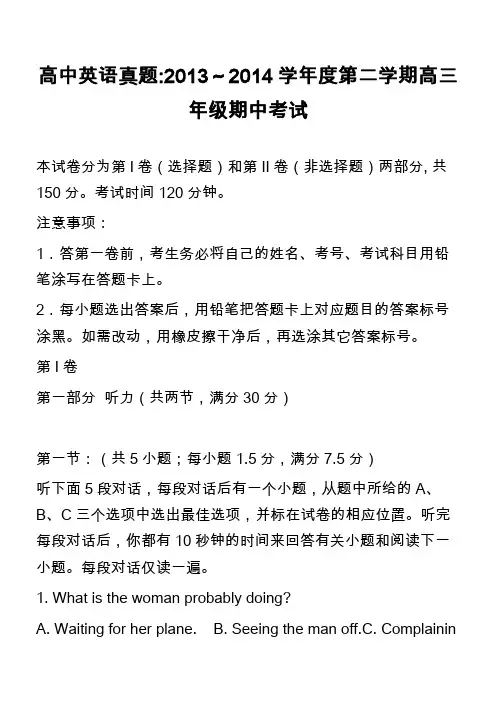
高中英语真题:2013~2014学年度第二学期高三年级期中考试本试卷分为第I卷(选择题)和第II卷(非选择题)两部分, 共150分。
考试时间120分钟。
注意事项:1.答第一卷前,考生务必将自己的姓名、考号、考试科目用铅笔涂写在答题卡上。
2.每小题选出答案后,用铅笔把答题卡上对应题目的答案标号涂黑。
如需改动,用橡皮擦干净后,再选涂其它答案标号。
第I卷第一部分听力(共两节,满分30分)第一节:(共5小题;每小题1.5分,满分7.5分)听下面5段对话,每段对话后有一个小题,从题中所给的A、B、C三个选项中选出最佳选项,并标在试卷的相应位置。
听完每段对话后,你都有10秒钟的时间来回答有关小题和阅读下一小题。
每段对话仅读一遍。
1. What is the woman probably doing?A. Waiting for her plane.B. Seeing the man off.C. Complaining to the man.2. What does the woman want to buy?A. Beach blankets.B. Some pictures.C. Some film.3. Why does the man apologise to the woman?A. He ordered the wrong table.B. He called her by mistake.C. He went to the wrong address.4. What does the man think is wrong with the plant?A. It needs to be watered at present.B. It should be moved into a large pot.C. It is not getting enough sunshine.5. What is the man concerned about?A. The time to fix the problem.B. The problem of the car.C. The way to get home.第二节(共15小题;每小题1.5分,满分22.5分)听下面5段对话或独白。
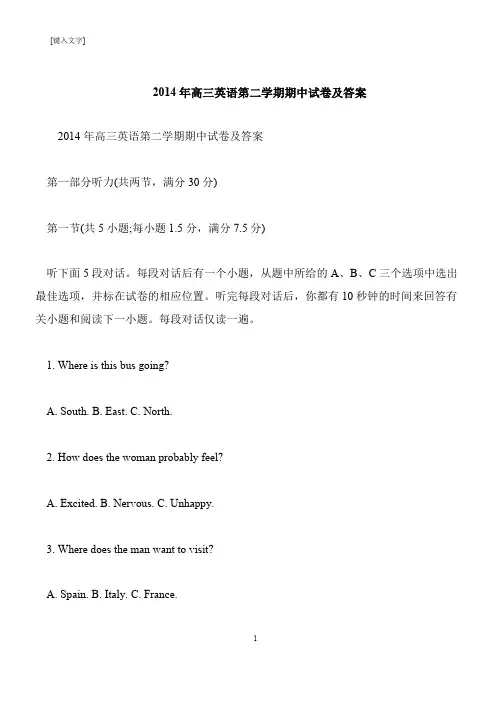
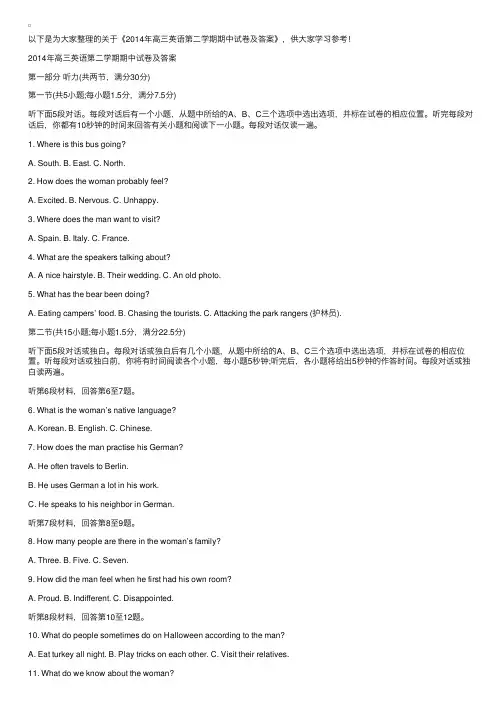
以下是为⼤家整理的关于《2014年⾼三英语第⼆学期期中试卷及答案》,供⼤家学习参考!2014年⾼三英语第⼆学期期中试卷及答案第⼀部分听⼒(共两节,满分30分)第⼀节(共5⼩题;每⼩题1.5分,满分7.5分)听下⾯5段对话。
每段对话后有⼀个⼩题,从题中所给的A、B、C三个选项中选出选项,并标在试卷的相应位置。
听完每段对话后,你都有10秒钟的时间来回答有关⼩题和阅读下⼀⼩题。
每段对话仅读⼀遍。
1. Where is this bus going?A. South.B. East.C. North.2. How does the woman probably feel?A. Excited.B. Nervous.C. Unhappy.3. Where does the man want to visit?A. Spain.B. Italy.C. France.4. What are the speakers talking about?A. A nice hairstyle.B. Their wedding.C. An old photo.5. What has the bear been doing?A. Eating campers’ food.B. Chasing the tourists.C. Attacking the park rangers (护林员).第⼆节(共15⼩题;每⼩题1.5分,满分22.5分)听下⾯5段对话或独⽩。
每段对话或独⽩后有⼏个⼩题,从题中所给的A、B、C三个选项中选出选项,并标在试卷的相应位置。
听每段对话或独⽩前,你将有时间阅读各个⼩题,每⼩题5秒钟;听完后,各⼩题将给出5秒钟的作答时间。
每段对话或独⽩读两遍。
听第6段材料,回答第6⾄7题。
6. What is the woman’s native language?A. Korean.B. English.C. Chinese.7. How does the man practise his German?A. He often travels to Berlin.B. He uses German a lot in his work.C. He speaks to his neighbor in German.听第7段材料,回答第8⾄9题。
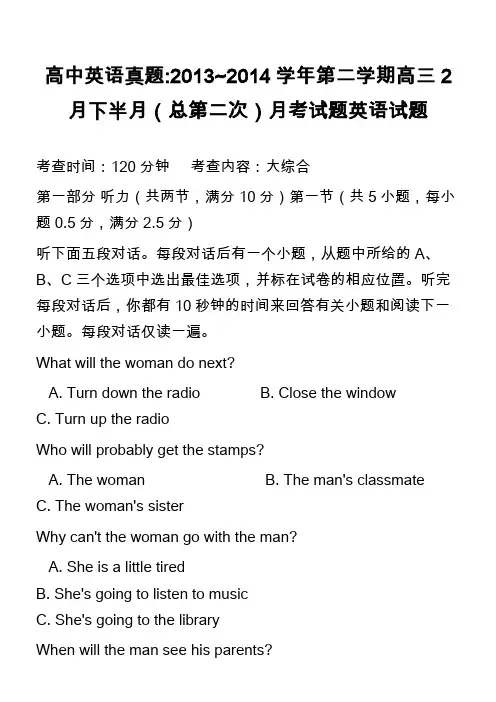
高中英语真题:2013~2014学年第二学期高三2月下半月(总第二次)月考试题英语试题考查时间:120分钟考查内容:大综合第一部分听力(共两节,满分10分)第一节(共5小题,每小题0.5分,满分2.5分)听下面五段对话。
每段对话后有一个小题,从题中所给的A、B、C三个选项中选出最佳选项,并标在试卷的相应位置。
听完每段对话后,你都有10秒钟的时间来回答有关小题和阅读下一小题。
每段对话仅读一遍。
What will the woman do next?A. Turn down the radioB. Close the windowC. Turn up the radioWho will probably get the stamps?A. The womanB. The man's classmateC. The woman's sisterWhy can't the woman go with the man?A. She is a little tiredB. She's going to listen to musicC. She's going to the libraryWhen will the man see his parents?A. At 10:00B. At 8:00C. At 12:00Where does the conversation take place?A. At homeB. At a travel agencyC. In a hotel第二节(共15小题; 每小题.0.5分,满分7.5分)听下面5段对话。
每段对话后有几个小题,从题中所给的A、B、C三个选项中选出最佳选项,并标在试卷的相应位置。
每段对话读两遍。
听第6段材料.回答第6至7题。
What does the woman ask the man to send?A. A reportB. An e-mailC. A letterFor whom will the man reserve a room in the Garden Hotel?A. For the womanB. For Mr. SimpsonC. For Mr. Black听第7段材料.回答第8至9题。
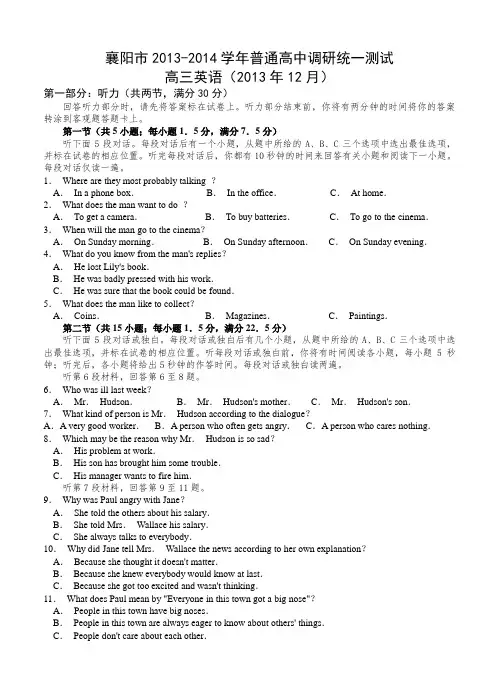
襄阳市2013-2014学年普通高中调研统一测试高三英语(2013年12月)第一部分:听力(共两节,满分30分)回答听力部分时,请先将答案标在试卷上。
听力部分结束前,你将有两分钟的时间将你的答案转涂到客观题答题卡上。
第一节(共5小题;每小题1.5分,满分7.5分)听下面5段对话。
每段对话后有一个小题,从题中所给的A、B、C三个选项中选出最佳选项,并标在试卷的相应位置。
听完每段对话后,你都有10秒钟的时间来回答有关小题和阅读下一小题。
每段对话仅读一遍。
1.Where are they most probably talking ?A.In a phone box.B.In the office.C.At home.2.What does the man want to do ?A.To get a camera.B.To buy batteries.C.To go to the cinema.3.When will the man go to the cinema?A.On Sunday morning.B.On Sunday afternoon.C.On Sunday evening.4.What do you know from the man's replies?A.He lost Lily's book.B.He was badly pressed with his work.C.He was sure that the book could be found.5.What does the man like to collect?A.Coins.B.Magazines.C.Paintings.第二节(共15小题;每小题1.5分,满分22.5分)听下面5段对话或独白。
每段对话或独白后有几个小题,从题中所给的A、B、C三个选项中选出最佳选项,并标在试卷的相应位置。
听每段对话或独白前,你将有时间阅读各小题,每小题5秒钟;听完后,各小题将给出5秒钟的作答时间。
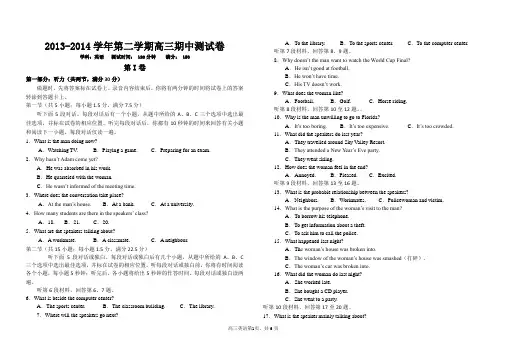
2013-2014学年第二学期高三期中测试卷学科:英语测试时间: 120分钟满分: 150第I卷第一部分:听力(共两节,满分30分)做题时,先将答案标在试卷上。
录音内容结束后,你将有两分钟的时间将试卷上的答案转涂到答题卡上。
第一节(共5小题;每小题1.5分,满分7.5分)听下面5段对话。
每段对话后有一个小题,从题中所给的A、B、C三个选项中选出最佳选项,并标在试卷的相应位置。
听完每段对话后,你都有10秒钟的时间来回答有关小题和阅读下一小题。
每段对话仅读一遍。
1.What is the man doing now?A.Watching TV. B.Playing a game. C.Preparing for an exam.2.Why hasn’t Adam come yet?A.He was absorbed in his work.B.He quarreled with the woman.C.He wasn’t informed of the meeting time.3.Where does the conversation take place?A.At the man’s house.B.At a bank. C.At a university.4.How many students are there in the speakers’ class?A.18. B.21. C.20.5.What are the speakers talking about?A.A workmate. B.A classmate. C.A neighbour.第二节(共15小题;每小题1.5分,满分22.5分)听下面5段对话或独白。
每段对话或独白后有几个小题,从题中所给的A、B、C 三个选项中选出最佳选项,并标在试卷的相应位置。
听每段对话或独白前,你将有时间阅读各个小题,每小题5秒钟;听完后,各小题将给出5秒钟的作答时间。
高中英语真题:2013~2014学年第二学期高一期中考试本卷时间120分钟,满分150分注意:答案全部写在答卷上一、听力(共两节;每小题1分,满分20分)第一节请听下面5段对话。
每段对话后有一个小题,从题中所给的A、B、C三个选项中选出最佳选项,并标在试卷的相应位置。
听完每段对话后,你都有10秒钟的时间来回答有关小题和阅读下一个小题。
每段对话仅读一遍。
1. How does the woman’s sister go to university every day?A. On foot.B. By underground.C. By bus .2. What does the man mean?A. He used to like boating very much.B. He won’t go boating with the woman.C. He thinks it is too cold outside today.3. What will the woman probably do this afternoon?A. Go for a job interview.B. Give the man some advice.C. Ask the man for help.4. Why does the man want to know how to take care of babies?A. He wants to be a baby sitter.B. He is going to be a brot her.C. His wife is pregnant.5. What does the man think of the woman’s experience?A. Unusual.B. Dull.C. Exhausting.第二节听下面5段对话或独白。
每段对话或独白后有几个小题,从题中所给的A、B、C三个选项中选出最佳选项,并标在试卷的相应位置。
高中英语真题:2013—2014学年度第二学期第一部分听力(共两节,满分15分)听力理解(共9小题;每小题1分,满分9分)根据各段播放内容及其相关小题,从题中所给的A、B、C项中,选出最佳选项,并在答题卡上相应的位置涂黑。
听下面一段对话,回答第1-2题。
1. Why will the man go to the center of the city?A. To do some shopping.B. To pick up his mother.C. To take the woman there.2. When will the two speakers meet tomorrow?A. At 10:00 this morning.B. At 10:00 tomorrow morning.C. At 10:00 tomorrow evening.听下面一段对话,回答第3-4题。
3. What does the man think of the coats?A. Too poorly made.B. Very expensive.C. Not suitable.4. Why did the woman call the man yesterday?A. To invite him to a picnic.B. To invit e him to a fashion show.C. To ask him about a fashion show.听下面一段对话,回答第5-6题。
5. What does the man want to drink?A. Ice cold water.B. Tea.C. Hot water.6. What will the man and his friend probably do next?A. Order something to drink.B. Wait for their friends.C. Order right away.听下面一段对话,回答第7-9题。
2013-2014学年度高三复习阶段性检测英语试题2014.01 本试卷分第I卷和第II卷两部分,共12页。
满分150分。
考试用时120分钟。
考试结束后,将本试卷和答题卡一并交回。
注意事项:1.答题前,考生务必用0.5毫米黑色签字笔将自己的姓名、座号、准考证号、县区和科类填写在答题卡和试卷规定的位置上。
2.第I卷每小题选出答案后,用2B铅笔把答题卡上对应题目的答案标号涂黑;如需改动,用橡皮擦干净后,再选涂其他答案标号。
3.第II卷必须用0.5毫米黑色签字笔作答,答案必须写在答题卡各题目指定区域内相应的位置,不能写在试卷上;如需改动,先划掉原来的答案,然后再写上新的答案;不能使用涂改液、胶带纸、修正带。
不按以上要求作答的答案无效。
第I卷(共100分)第一部分知识运用(共两节,满分50分)第一节单项选择(共20小题;每小题1分,满分20分)从A、B、C、D四个选项中,选出可以填入空白处的最佳选项,并在答题卡上将该项涂黑。
1. Anger is bad emotion, which can do great harm to your health.A.不填;不填B. the; aC. a; 不填D. a; a2. A proper study plan can help students reduce their exam .A. attitudeB. anxietyC. curiosityD. attack3. It was during my stay in Paris studying art I picked up some French.A. whereB. whichC. whenD. that4. Anyway, I can‟t lie about it-it‟s my principles.A. againstB. withC. onD. by5. about it earlier, we could have warned people of the danger.A. Would we knowB. Should we knowC. Have we knownD. Had we known6. You have no idea I have gone through during the last few months.A. whatB. whichC. thatD. when7. The case of Li Gang became a hot topic and so did of Li Tianyi.A. itB. oneC. thatD. this8. The greenbelt, once , will greatly improve the local environment.A. finishingB. finishedC. having finishedD. to finish9. Listening, much importance should be attached, is well worth practising every day.A. from thatB. from whichC. to whichD. for what10. Take the umbrella with you in case it .A. may rainB. will rainC. rainedD. rains11. The alarm clock has stopped. I get it to go again or I might be late tomorrow.A. canB. mustC. couldD. may12. the feelings of the neighbouring nations, the Japanese prime minister visited Yasukuni shrine(靖国神灶).A. Apart fromB. In addition toC. But forD. Regardless of13. Jennifer will stop dinner, so she won‟t be here very soon.A. to haveB. havingC. having hadD. to have had14. In China you can see people using mobile phones while driving, is illegal in many other countries.A. whereB. whenC. whichD. who15.-Do you like my new shoes? They cost only £15.- Wow! That‟s cheap, what a !A. gainB. profitC. bargainD. win16.- You seem to be familiar with this city.- I here for three years. It‟s great to be back for a visit.A. livedB. have livedC. had livedD. live17. There is always a debate on human beings are born good or bad.A. whichB. whatC. thatD. whether18. It was of you not to disturb the Senior Three students at night.A. considerateB. patientC. convenientD. modest19. I remembered that the air conditioners turned off before I left office.A. wereB. had beenC. were to beD. have been20. -Here you are at the railway station.- ! I‟ve forgotten the ticket!A. So soonB. All rightC. Oh noD. Well done第二节完形填空,(共20小题;每小题1.5分,满分30分)阅读下面短文,从短文后各题所给的四个选项(A、B、C和D)中选出可以填入空白处的最佳选项,并在答题卡上将该项涂黑。
2013——2014学年度高三阶段性教学质量检测高三英语试题(2014.01) 本试卷分第1卷和第Ⅱ卷两部分,共12页。
满分150分。
考试用时120分钟。
考试结束后,将本试卷和答题卡一并交回。
注意事项:1.答题前,考生务必用0.5毫米黑色签字笔将自己的姓名、座号、准考证号、县区和科类填写在答题卡和试卷规定的位置上。
2.第1卷每小题选出答案后,用2B铅笔把答题卡上对应题目的答案标号涂黑;如需改动,用橡皮擦干净后,再选涂其他答案标号。
3.第1I卷必须用0.5毫米黑色签字笔作答,答案必须写在答题卡各题目指定区域内相应的位置,不能写在试卷上;如需改动,先划掉原来的答案,然后再写上新的答案;不能使用涂改液、胶带纸、修正带。
不按以上要求作答的答案无效。
第I卷(共105分)第一部分听力(共两节.满分30分)该部分分为第一、第二两节。
注意:回答听力部分时,请先答案标在试卷上。
听力部分结束前,你将有两分钟的时间将你的答案转涂到客观题答题卡上。
第一节(共5小题;每小题I.5分,满分7.5分)听下面5段对话。
每段对话后有一个小题,从题中所给的A、B、C三个选项中选出最佳选项,并标在试卷的相应位置。
听完每段对话后,你都有10秒钟的时间来回答有关小题和阅读下一小题。
每段对话仅读一遍。
1.What does Ann most probably like?A.Apples.B.Bananas.C.Peaches.2.Who is the woman sending a postcard to?A.An old friend.B.A pen friend.C.A relative.3.Why did the man answer fail to answer the.phone?A.Because something was wrong with the Phone.B.Because he forgot tO take the phone with him.C.Because he stayed up in his office all night.4.What,S the weather like today?A.Hot.B.Warm.C.Cold.5.What does the woman advise the man to do?A.To move to a new neighborhood.B.To have a talk with the couple.C.To make friends with the couple.第二节(共15小题;每小题1.5分,满分22.5分)听下面5段对话或独自。
2013-2014学年度第二学期高三年级英语科周测试题(考试时间:120分钟,满分:135分)第一部分语言知识及运用(共两节,满分45分)第一节完形填空(共15小题;每小题2分, 满分30分)阅读下面短文,掌握其大意,然后从1~15各题所给的A、B、C和D项中,选出最佳选项,并将答案涂在答题卡标号为1~15的相应位置上。
You have waited 45 minutes for the valuable 10 minutes’ break between classes. But when t he bell for the next class rings, you can’t [1] ________ how quickly time has passed.If you are familiar with this scene, you’ll know how time flies when you are having fun and [2] ________ when you are bored. Now scientists have come up with a reason why this is the case.Scans have shown that patterns of activity in the brain [3] ________ according to how we focus on a task. When we are [4] ________, we concentrate more on how time is passing. And this makes our brains think that the clock is ticking more [5] ________.In an experiment [6] ________ by a French laboratory, 12 volunteers watched an image while researchers monitored their brain activity. The volunteers were told to [7] ________ concentrate on how long an image appeared for, then focus on the [8] ________ of the image, and thirdly, study both duration and color. The results showed that the [9] ________ was more active when the volunteers paid attention to more subjects.It is thought that if the brain is [10] ________ focusing on many aspects of a task, it has to [11] ________ its resources, and pays less attention to the clock. [12] ________, time passes without us really [13] ________ it and seems to go quickly. On the contrary, if the brain is not so active, it concentrates its [14] ________ energies on monitoring the passing of time. Thus time seems to drag.Next time when you feel bored in [15] ________, perhaps you should pay more attention to what the teacher is saying!1. A. guess B. believe C. learn D. doubt2. A. stops B. drags C. backs D. gains3. A. develop B. appear C. change D. grow4. A. sleepy B. excited C. bored D. active5. A. quickly B. slowly C. smoothly D. exactly6. A. performed B. carried C. tried D. produced7. A. firstly B. quickly C. carefully D. partly8. A. origin B. color C. design D. meaning9. A. researchers B. experiment C. brain D. clock10. A. worthy B. funny C. ready D. busy11. A. spread B. gather C. reach D. focus12. A. However B. Furthermore C. Finally D. Therefore13. A. recognizing B. watching C. counting D. noticing14. A. enough B. endless C. full D. proper15. A. hospital B. class C. mind D. bed第二节语法填空(共10小题,每小题1.5分,满分15分)阅读下面短文,按照句子结构的语法性和上下文连贯的要求,在空格处填入一个适当的词或使用括号中词语的正确形式填空,并将答案填写在答题卡标号为16-25的相应位置上。
高中英语真题:2013~2014学年第二学期期中考查本试卷分第Ⅰ卷(选择题)和第Ⅱ卷(非选择题)两部分。
满分100分,考试用时120分钟。
第I卷(选择题,共80分)第一部分:听力(共两节,满分10分)第一节(共5小题;每小题0.5分,满分2.5分)听下面5段对话。
每段对话后有一个小题,从题中所给的A、B、C三个选项中选出最佳选项,并标在试卷的相应位置。
听完每段对话后,你都有10秒钟的时间来回答有关小题和阅读下一小题。
每段对话仅读一遍。
1. What did the man win in his dream?A.A holiday to .B. A holiday to .C. A holiday to .2. Will the woman come to the party?A. Maybe.B. No.C. Certainly.3. How long has the woman been an author?A.About 30 years.B.About 40 years.C.About 50 years.4. What does the man think of their plan?A. Not good.B. Better than others.C. A t least as good as others.5. How will the woman probably go to school?A.In the man’s car.B. On foot.C.By taxi.第二节(共15小题;每小题0.5分,满分7.5分)听下面5段对话或独白。
每段对话或独白后有几个小题,从题中所给的A、B、C三个选项中选出最佳选项,并标在试卷的相应位置。
听每段对话或独白前,你将有时间阅读各个小题,每小题5秒钟;听完后,各小题将给出5秒钟的作答时间。
每段对话或独白读两遍。
听第6段对话。
回答第6至8题。
6. Who is the man?A. A storywriter.B. A policeman.C. A reporter.7. What are the two speakers talking about?A. A personal stealing.B. A bank robbery.C. A murder case.8. When does this conversation take place?A. In the morning.B. In the afternoon.C. In the evening.听第7段材料,回答第9至11题。
2013-2014学年第二学期高三期中测试卷学科:英语测试时间: 120分钟满分: 150第I卷第一部分:听力(共两节,满分30分)做题时,先将答案标在试卷上。
录音内容结束后,你将有两分钟的时间将试卷上的答案转涂到答题卡上。
第一节(共5小题;每小题1.5分,满分7.5分)听下面5段对话。
每段对话后有一个小题,从题中所给的A、B、C三个选项中选出最佳选项,并标在试卷的相应位置。
听完每段对话后,你都有10秒钟的时间来回答有关小题和阅读下一小题。
每段对话仅读一遍。
1.What is the man doing now?A.Watching TV.B.Playing a game.C.Preparing for an exam.2.Why hasn’t Adam come yet?A.He was absorbed in his work.B.He quarreled with the woman.C.He wasn’t informed of the meeting time.3.Where does the conversation take place?A.At the man’s house.B.At a bank.C.At a university.4.How many students are there in the speakers’ class?A.18.B.21.C.20.5.What are the speakers talking about?A.A workmate.B.A classmate.C.A neighbour.第二节(共15小题;每小题1.5分,满分22.5分)听下面5段对话或独白。
每段对话或独白后有几个小题,从题中所给的A、B、C 三个选项中选出最佳选项,并标在试卷的相应位置。
听每段对话或独白前,你将有时间阅读各个小题,每小题5秒钟;听完后,各小题将给出5秒钟的作答时间。
每段对话或独白读两遍。
听第6段材料,回答第6、7题。
6.What is beside the computer center?A.The sports center.B.The classroom building.C.The library.7.Where will the speakers go next?A.To the library.B.To the sports center.C.To the computer center.听第7段材料,回答第8、9题。
8.Why doesn’t the man want to watch the World Cup Final?A.He isn’t good at football.B.He won’t have time.C.His TV doesn’t work.9.What does the woman like?A.Football. B.Golf. C.Horse riding.听第8段材料,回答第10至12题。
、10.Why is the man unwilling to go to Florida?A.It’s too boring. B.It’s too expensive. C.It’s too crowded.11.What did the speakers do last year?A.They travelled around Sky Valley Resort.B.They attended a New Year’s Eve party.C.They went skiing.12.How does the woman feel in the end?A.Annoyed.B.Pleased.C.Excited.听第9段材料,回答第13至16题。
13.What is the probable relationship between the speakers?A.Neighbors.B.Workmates.C.Policewoman and victim.14.What is the purpose of the woman’s visit to the man?A.To borrow his telephone.B.To get information about a theft.C.To ask him to call the police.15.What happened last night?A.The woman’s house was broken into.B.The window of the woman’s house was smashed(打碎).C.The woman’s car was broken into.16.What did the woman do last night?A.She worked late.B.She bought a CD player.C.She went to a party.听第10段材料,回答第17至20题。
17.What is the speaker mainly talking about?A. Doxey’s theory.B. The development of tourism.C. The influence of social factors on tourism.18.Why do people in the host area welcome the tourists in the first stage?A.They benefit from them.B.They are curious.C.They learn from them.19.What influences relationships between tourists and host people in the second stage?A.Commercial factors.B.Political factors. C.Social factors.20.What does the government do in the fourth stage?A.They protect the host area.B.They set more restrictions.C.They provide public services.第二部分:阅读理解(共两节,满分40分)第一节(共15小题;每小题2分,满分30分)阅读下列短文,从每题所给的四个选项(A,B,C和D)中,选出最佳选项。
AI once met a well-known botanist at a dinner party. I had never talked with a botanist before, and I found him fascinating. I sat there absorbed and listened while he spoke of unusual plants and his experiments (he even told me astonishing facts about the simple potato). I had a small indoor garden of my own ---and he was good enough to tell me how to solve some of my problems.As I said, we were at a dinner party. There must have been a dozen other guests, but I broke an important rule of politeness. I ignored everyone else and talked for hours to the botanist.Midnight came, I said good night to everyone and departed. The botanist then turned to our host and said many nice things about me, including that I was a “most interesting conversationalist.”An interesting conversationalist? I had said hardly anything at all. I couldn’t have said anything if I had wanted to without changing the subject, for I didn’t know any more about plants than I knew about sharks. But I had done this one thing: I had listened carefully. I listened because I was really interested. And he felt it. Naturally that pleased him. That kind of listening is one of the best ways to show respect to others, and it makes them feel great too. “Few human beings,” wrote Jack Woodford in Strangers in Love, “can resist the sweet effect of rapt attention.” I went even further than that. I was “sincere in my admiration and generous in my praise.”I told him that I had been hugely entertained and instructed. I had. I told him I wished I had his knowledge. I told him that I should love to wander the fields with him. What’s more, it was all true.And so I had him thinking of me as a good conversationalist when, in reality, I had been merely a good listener and had encouraged him to talk.21. Which of the following does the writer describe as a rule of politeness at dinner parties?A. Avoiding discussions about politics and religion.B. Listening carefully to what another guest says.C. Arriving and leaving at the appropriate time.D. Giving attention to all those in attendance.22. The underlined expression “rapt attention” in Paragraph 4 is closest in meaning to_______.A. full understandingB. strong interestC. great uncertaintyD. little curiosity23. According to the writer, which of the following is an important characteristic of a good conversationalist?A. Listening attentively and encouraging the other side to continue.B. Encouraging the other side by sharing his/her own opinions.C. Promising a future meeting for more communication.D. Expressing respect by nodding his/her head.24. What is the purpose of the passage?A. To prove the writer is an interesting conversationalist.B. To share an interesting experience at a dinner party.C. To explain what makes a good conversationalist.D. To show that botanists can be really talkative.BA dog-lover has invented a high-tech way of feeding his pet by Twitter(推特,国外流行社交网络,类似于微博). Computer expert Nat Morris, 30, has designed a system to give his pet a “tweet treat” by sending him a Twitter message.His dog Toby gets some delicious dog biscuits from a computer-controlled food machine whenever Nat sends a message to “@feedtoby”.Nat often works away from home and isn’t always able to feed Toby by hand. But his new invention allows Nat to feed his dog from anywhere in the world.Nat said, “Toby absolutely loves it. At first he didn’t know what was going on. Now he sits underneath the machine, wagging his tail and waiting for the treats to drop.”Nat fills the food machine with small pieces of dog biscuits, but not too many in case four-year-old Toby gets too many messages. And Nat has even equipped his house with an online camera so he can see Toby enjoying the food at his home.But one problem is that friends and family have been so amazed with the “Tweet treat” machine that they have started to send tweets to Toby too. So Nat has had to restrict feeding time to make sure Toby doesn’t turn into Tubby。